- Home
- Arthur Miller
Timebends
Timebends Read online
ARTHUR MILLER
TIMEBENDS
A LIFE
For Inge
Contents
Foreword by Richard Eyre
Introduction
Chapter One
Chapter Two
Chapter Three
Chapter Four
Chapter Five
Chapter Six
Chapter Seven
Chapter Eight
Afterword by Christopher Bigsby
Plate Section
A Note on the Author
By the Same Author
Foreword by Richard Eyre
Good autobiographies have often been written about small lives but few great men have succeeded in balancing the equation between life and literature. Arthur Miller lived a great life and Timebends is a great account of the first seventy years of it. It was my luck to get to know him well during the succeeding nineteen.
Arthur wrote more than thirty plays and continued to write until his death, premiering a new play in Chicago and writing short stories for the New-Yorker in his eighty-ninth year. His last play, a wryly comic account of the making of The Misfits, was, with immaculate irony, called Finishing the Picture. When he died Harold Pinter said, “I’m pretty convinced he was writing until the day of his death. He was born with the pen in his hand.” He put social, political and moral issues at the heart of plays that triumphed in the “showshop” of Broadway, and at least two of his plays are indelible classics, still playing to huge acclaim in theatres throughout the world over fifty years after their conception. At the time of writing, Death of a Salesman has just opened in the West End to ecstatic audiences and rapturous reviews. I overheard a young girl coming out of the New York revival with her father. “It was like looking at the Grand Canyon,” she said.
“A play”, he wrote in the Preface to his Collected Plays, “ought to make sense to common-sense people … the only challenge worth the effort is the widest one and the tallest one, which is the people themselves.” With Eugene O’Neill and Tennessee Williams, Miller brought passion, seriousness and poetry to the American theatre.
His writing earned him a cascade of honours – the Pulitzer Prize, several Tony Awards, Critics Circle Awards, an Obie, an Olivier, a Kennedy Lifetime Achievement Award, National Book Award, and a sheaf of honorary doctorates and degrees from all over the world. In his later years he was forever shuffling between cities – it could be to Tokyo or Paris or Oxford – to pick up prizes. Surprisingly, although he was known and honoured internationally as much for his defence of free speech as for his writing, he was overlooked for the Nobel Prize.
He was the best-known playwright in the world, probably since Shaw, and like Shaw a figure of great moral and intellectual stature. But Miller’s courage and liberal instincts were tested in a way that Shaw’s never were. He never baulked from taking a stand on political issues and enduring obloquy for doing so, being denied a passport by the State Department in 1954 to travel to Belgium to attend a production of The Crucible, and being convicted of contempt of Congress by the House Un-American Activities Committee in 1956 for refusing, as he said, “to say who was in the room during a meeting of left-wing writers in 1947”.
He made three marriages. The last, which endured happily for forty years, was to an outstanding photographer – one of the original Magnum group – Inge Morath, and if you’d been lucky enough to spend time with Arthur and Inge you’d have been capsized by the warmth, wit and humanity of the pair of them. When I directed The Crucible on Broadway in 2002 (the first production for fifty years) Inge was our rehearsal photographer. She was working with us until two weeks before her death: watchful, sympathetic and unobtrusive, her small Leica cupped in her hand and raised only very occasionally to her eye. “When I learnt to be a photographer we only had a few rolls of film: I had to be selective.” On her last day with us she deflected any enquiry about her illness with a shrug but was obviously in pain; her last photographs – of the final scene between John Proctor and his wife, Elizabeth – were beautifully composed but out of focus, as if blurred with tears. They must have been ours, for she would never have stooped to self-pity. As the actress Zoë Caldwell, who was married to Miller’s lifelong friend and producer Bobert Whitehead, said, “He was lucky enough to have extraordinary women in his life.”
His most extraordinary, or at least conspicuous, marriage was, of course, to his second wife, Marilyn Monroe, and it was she who dominated the British headlines when he died. “Will Arthur Miller be remembered as the man who married Marilyn Monroe?” they asked, ignoring the fact that, while Monroe’s star burned brightly in the constellation of the movies when they married in 1956, in the firmament of the world’s theatre Arthur Miller was the North Star and the Southern Cross: he’d already written four of the best plays of the twentieth century. What’s more, for all that the marriage careened into desperate dysfunction, it started as a match of two people who idealised each other. What the malign scorn of Miller at the time concealed – and it still lurks in the minds of tabloid journalists – was this question: why would the world’s most attractive woman want to go out with a playwright?
It was the same feelings – a mixture of prurience and envy – which underwrote the motives of the House Un-American Activities Committee when they summoned Miller to appear in front of them. I asked him about it some years ago. “I knew perfectly well why they had subpoenaed me,” he said,
it was because I was engaged to Marilyn Monroe. Had I not been, they’d never have thought of me. They’d been through the writers long before and they’d never touched me. Once I became famous as her possible husband, this was a great possibility for publicity. When I got to Washington, preparing to appear before that committee, my lawyer received a message from the chairman saying that if it could be arranged that he could have a picture, a photograph taken with Marilyn, he would cancel the whole hearing. I mean, the cynicism of this thing was so total, it was asphyxiating.
I had met Arthur first at the National Theatre and I presented four of his plays during my time as Director, but I only got to know him well during rehearsals of The Crucible. He loved our production and was closely involved with it. I never got over the joy and pride of sitting beside him as his great play unfolded in front of us while he beamed and muttered, “It’s damned good stuff, this.”
At the time it was particularly good stuff because the play resonated in two directions: on the one hand the Taliban came to mind as a parallel to the theocratic government under which the Puritan inhabitants of Salem lived with their ethos of rigid sexual morality and cruel punishment; and on the other hand a society in which all dissent is construed as opposition wasn’t remote from the US in the year after 9/11. The play had been inspired by the actions of the House Un-American Activities Committee in the 1950s, but contemporary events had an uncomfortable symmetry. The Patriot Act, which relaxed many of the rules protecting people suspected of crime from unfair investigation and prosecution, had recently been introduced, and the Attorney-General had said that civil rights activists who questioned or opposed the legislation were giving aid and comfort to the terrorists. “A person is either with this court or he must be counted against it, there be no road between,” says Deputy-Governor Danforth – the equivalent to the Attorney-General – in the play.
There were other uncomfortable resonances. “The axis of evil” had been invoked by George Bush, the forces of “good” were lined up against the armies of Satan, the Stars and Stripes were displayed in shop windows, front yards, on car bonnets and jacket lapels, and God was asked to bless America on every street comer with at least the same insistence as the mullahs in the mosques. You felt, as well as the strong streak of Christian fundamentalism in America, that the true religion was America itself
. “This is a sharp time, a precise time,” says Danforth, “we live no longer in the dusky afternoon when evil mixed itself with good and befuddled the world. Now, by God’s grace the shining sun is up, and them that fear not light will surely praise it.” Everyone who saw the play said it was “timely”. They meant that it was timeless.
(Miller always reclaimed the past in his plays as a means of understanding the future, and his recurrent subjects were the Holocaust and the Depression, betrayal in private and public life, guilt and loss of innocence: Cain wandering in a spiritual wilderness. The Depression provided his sentimental education: the family business was destroyed and the family was reduced to relative poverty. I talked to him once about it as we walked in the shadow of the pillars of the Brooklyn Bridge looking out over the East River. “America”, he said, “was promises and the Crash was a broken promise in the deepest sense. I think the Americans in general live on the edge of a cliff, they’re waiting for the other shoe to drop. I don’t care who they are. It’s part of the vitality of the country, maybe. That they’re always working against this disaster that’s about to happen.” Then he stopped, looking up at the bridge. “These are our cathedrals,” he said.
“I thought those were,” I said, pointing across the river to the Business District and the twin towers of the World Trade Center (this was in 1999).
“Oh sure. ‘The business of America is business’, that’s what Calvin Coolidge used to say. He was the first President I can remember.” Then he stared at the buildings. “None of them were here when I lived here. Not one. And in all those windows there’ll be somebody counting figures. Piling up money.” Then he smiled ruefully. “And snorting cocaine, I guess.”
Arthur was wonderful company – a great, a glorious, raconteur. I asked him once what happened on the first night of Death of a Salesman when it opened on the road in Philadelphia. He must have told the story a thousand times but he repeated it, pausing, seeming to search for half-buried details, as if it was the first time:
The play ended and there was a dead silence and I remember being in the back of the house with Kazan and nothing happened. The people didn’t get up either. Then one or two got up and picked up their coats. Some of them sat down again. It was chaos. Then somebody clapped and then the house fell apart and they kept applauding for God knows how long and … I remember an old man being helped up the aisle, who turned out to be Bernard Gimbel, who ran one of the biggest department store chains in the United States who was literally unable really to navigate, they were helping him up the aisle. And it turned out that he had been swept away by the play and the next day he issued an order that no one in his stores – I don’t know, eight or ten stores all over the United States – was to be fired for being over age!
And with this he laughed, a deep, husky, bass chortle, shaking his head as if the memory were as fresh as last week.
He was a deeply attractive man: tall, almost hulking, broad-shouldered, square-jawed, with the most beautiful large, strong but tender hands – carpenter’s hands. There was nothing evasive or small-minded about him, and for all his relish for describing the villainies of corporate America and the venalities of politicians, he was a cheery optimist. As he aged he became both more monumental and more approachable, his great body not so much bent as folded over. “I’m eighty-six and I’m opening a play,” he said with rueful wonder as we sat backstage at the end of the first night of The Crucible. With the death of Inge he had taken a battering, but when he appeared on the stage and the audience received him and his play with unmodified rapture, he seemed to be twenty years younger. “At least the play’s still living,” he said.
It’s been surprising for me – and sometimes shocking – to discover that my high opinion of Arthur Miller and his work was often not held by those who consider themselves the curators of American theatre. I read a discussion in the New York Times a few years ago between three theatre critics about the differences between British and American theatre:
FIRST CRITIC Arthur Miller is celebrated there.
SECOND CRITIC It’s Death of a Salesman, for crying out loud. He’s so cynical about American culture and American politics. The English love that.
FIRST CRITIC Though Death of a Salesman was not a smash when it first opened in London.
THIRD CRITIC It’s also his earnestness.
If in Britain we continue to admire Arthur Miller, it’s because we have the virtuous habit of treating his plays as contemporaneous and find that they speak to us today not because of their “earnestness” but because they are serious – that’s to say they’re about something. They have an ambition to make theatre matter.
This ambition didn’t come out of nowhere: when he was writing Death of a Salesman, Miller saw Tennessee Williams’s A Streetcar Named Desire and it opened “one specific door, one that didn’t deal so much with the story or characters or direction, but with words and their liberation, with the joy of the writer in writing them, the radiant eloquence of its composition, that moved me more than all its pathos. It formed a bridge … to the whole tradition of unashamed word-joy that. . . we had turned our backs on.”
Inspired by Williams, in Death of a Salesman Miller created a new verbal language and a new theatrical one – even if the emblematic American profession of salesman was familiar to theatregoers from the character of Hickey in O’Neill’s The Iceman Cometh. Miller provided Willy Loman with a vocabulary and syntax that blended the cliches of everyday life with self-deluding aphorisms – “America is full of beautiful towns and fine upstanding people” – with immigrant parables – “Why, boys, when I was seventeen I walked into the jungle, and when I was twenty-one I walked out” – I and with slogans for success – “Be liked and you will never want”. These are repeated by Willy like a catechism for success and are bound together by Miller’s own vivid imagery – “the woods are burning, boys” – and muscled rhetoric.
The sinewy and passionate language that he used with unembarrassed enthusiasm has always been attractive to British actors and audiences weaned on Shakespeare. And in 1950, at a time when British theatre was toying with a phoney poetic drama – the plays of T. S. Eliot and Christopher Fry – there was real poetry in his plays or, to be exact, the poetry of reality: plays about life lived on the streets of Brooklyn or the farms of Massachusetts by working-class people foundering on the edges of gentility and resonating with metaphors of the American Dream and the American Nightmare – aspiration and desperation.
Arthur Miller’s work was felt in Britain like a distant and disturbing forest fire – a fire that did much to ignite British writers like John Osborne, Harold Pinter and Arnold Wesker; and later Edward Bond, David Storey and Trevor Griffiths; and later still David Edgar, Mike Leigh, David Hare. Along with Tennessee Williams, Miller lit up the British theatre and demonstrated that it was an art to be fought for and to be unembarrassed about taking seriously. What these writers found in Miller was a visceral power, an appeal to the senses beyond and below rational thought, and an ambition to deal with big subjects.
It was characteristic of Arthur to express his subjects as “issues” – a leaning towards advocacy of moral conceits – and the “issue” which most concerned him was America’s lack of a sense of its own history and the decay of the connective tissue between the past, the present and the future. “Whoever is writing in the United States,” he said, “is using the American Dream as an ironical pole of his story. People elsewhere tend to accept, to a far greater degree anyway, that the conditions of life are hostile to man’s pretensions.” But for all his ability to articulate themes in his work, he was a playwright who knew that the shortest route to bad plays was to write plays ballasted with the baggage of big themes.
His plays show the difficulty and the possibility of people – usually men – taking control of their own lives, “that moment when, in my eyes, a man differentiates himself from every other man, that moment when out of a sky full of stars he fixes on one star”. His heroes –
salesmen, dockers, policemen, farmers – all seek a sort of salvation in asserting their singularity, their self, their “name”. They redeem their dignity, even if it’s by suicide. Willy Loman cries out, “I am not a dime a dozen, I am Willy Loman . . .!”; Eddie Carbone in A View from the Bridge, broken and destroyed by sexual guilt and public shame, bellows, “I want my name”; and John Proctor in The Crucible, in refusing the calumny of condemning his fellow citizens, declaims, “How may I live without my name? I have given you my soul; leave me my name!” In nothing does Miller show his Americanism more than in the assertion of the right and necessity of the individual to own his own life – and, beyond that, how you reconcile the individual with society. In short, how you live your life.
But he wasn’t a political writer, nor was he a moralist; and he was only a realist in the sense that he was concerned with the realities of the forces that affect people’s lives rather than the superficial appearance of reality. His plays ask whether we take responsibility for each other: are we social animals? “Joe Keller’s trouble”, said Miller of the protagonist in All My Sons, “is not that he cannot tell right from wrong but that his cast of mind cannot admit that he, personally, has any viable connection with his world, his universe, or his society. He is not a partner in society, but an incorporated member, so to speak . . .” If there was a touch of the evangelist in his writing, his message was this: there is such a thing as society and art ought to be used to change it. Though it’s hard to argue that art saves lives, feeds the hungry or sways votes, Death of a Salesman comes as close as any writer can get to art as a balm for social concern.
“There are things which he stretched, but mainly he told the truth,” says Huckleberry Finn of his creator, Mark Twain. And the same could be said of Arthur Miller, which is perhaps why it’s not a coincidence that my enthusiasm for his writing came at the same time as my discovery of Mark Twain’s genius. And it’s not a surprise that what Arthur Miller said of Mark Twain could just as well have been said about him:

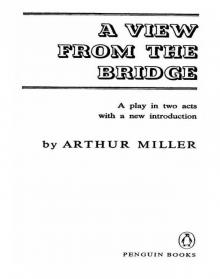 A View From the Bridge: A Play in Two Acts
A View From the Bridge: A Play in Two Acts Broken Glass
Broken Glass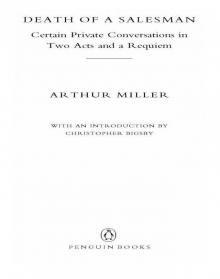 Death of a Salesman
Death of a Salesman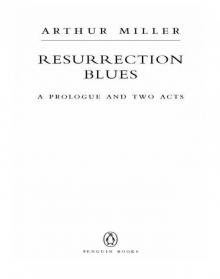 Resurrection Blues
Resurrection Blues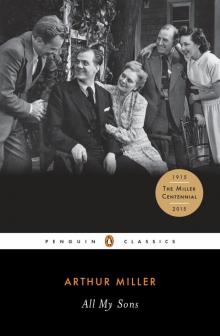 All My Sons
All My Sons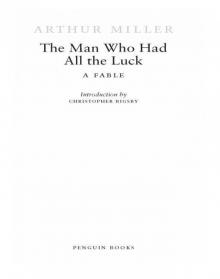 The Man Who Had All the Luck
The Man Who Had All the Luck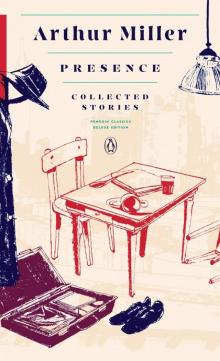 Presence: Stories
Presence: Stories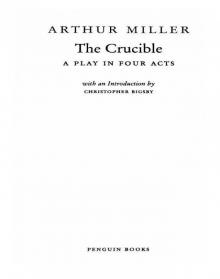 The Crucible
The Crucible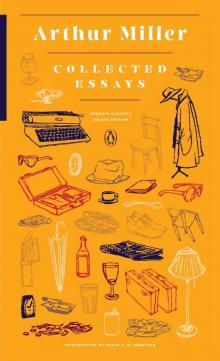 Collected Essays
Collected Essays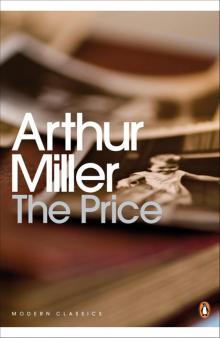 The Price
The Price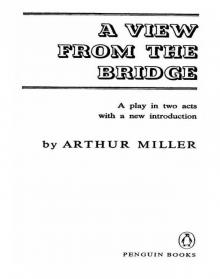 A View from the Bridge
A View from the Bridge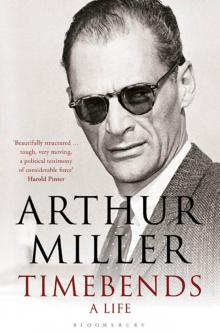 Timebends
Timebends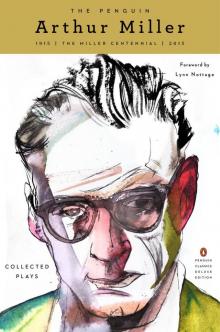 The Penguin Arthur Miller
The Penguin Arthur Miller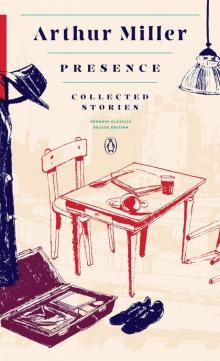 Presence
Presence